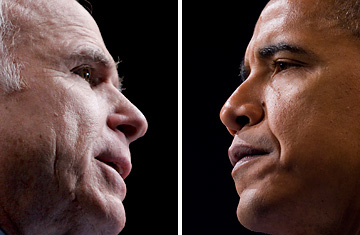
Presidential candidates John McCain and Barack Obama.
It's almost as if someone turned the campaign switch to "on" last week.
About time, too.
Not long after Barack Obama returned from his heady global tour last weekend, the contest accelerated abruptly and took on an edgier, headlong, take-no-prisoners tone. John McCain went from seeming lost and playing hapless defense to more focused offense. We'll learn soon how long that lasts, and at what price, but there were several days last week when McCain's team actually seemed in control of what passes for the campaign conversation. Obama saw his already thin lead narrow in a few places and was hinting by the end of the week that he might moderate his unpopular position on offshore oil drilling if lifting such a ban was part of a larger package of alternative energy initiatives. The week that started with Obama collecting generally positive reviews from his trip overseas ended with Minnesota Gov. Tim Pawlenty mocking him with a tire gauge. It stands to reason that Obama will find a way to retake the offensive soon, but who knows?
In any case, the new pace was overdue. In a race in which the Republican convention wraps up on September 4 and the election comes 60 days later, it was time to get things moving.
Besides, the voting starts soon. From what I can tell by looking at surveys of various state election rules, the first opportunity to cast a ballot between McCain and Obama will come on September 13, a mere nine days after the end of the GOP convention, when traditional absentee voting begins in Pennsylvania. The next day, September 14, Idahoans can walk into county election offices in that state and cast a vote in person. Within a week, voters in Delaware, Illinois, Iowa and Michigan, Virginia and Wyoming can cast their ballots by various means and under varying rules. Early voting in California begins on October 4, a month after the GOP convention ends. By mid-October, Americans will voting in nearly every state.
And what is perhaps most important of all is that they will be doing so in record numbers. About 20% of the electorate cast early ballots of some kind in 2004 and that figure jumped to 25% in the 2006 elections. Early voting experts believe it will skip again in this cycle to around 30%. That could mean that perhaps 35 to 40 million people will cast ballots before the polls open.
After years of discouraging this behavior, state and county governments are now doing the opposite. Many counties have early voting sites setup at various point in big cities; other states have removed the requirement that voters must provide "a reason" for voting early or by absentee. Deadlines are expanding in both directions so you can request absentee ballots sooner and cast them later. Voting is, slowly but surely, getting easier.
Which is why it was time for the candidates to take it up a notch.
***
I don't know enough about housing or finance to make a judgment about whether the measure President Bush signed this week was a good deal or not. About all you can say is that neither party had much choice. Washington could not let five trillion dollars worth of government backed agency paper default without sending a signal to investors and central banks in Asia — which held about a third of the debt — that its other guaranteed instruments, like Treasury bills, might not be secure. And so it jumped in to save Fannie and Freddie. I do know that the speed with which Congress acted on that legislation, after months of dithering, tells us a lot about how fast lawmakers can move when they need to.
And, yes, it was ironic to see a Republican president, with largely Democratic help, pass a measure that increases regulation, increases spending and may call for a public bailout of what are quasi-private companies. And there a number of other things in the measure that looked like election year pork. All that may be why the "signing ceremony" at the White House this week was so subdued. Bailing out what are publicly held companies is not what the Bush team came to Washington to do. But what is really surprising about making deals with the opposition? It was reminiscent of the way Bill Clinton had to rely on Republican votes to win passage of a balanced budget measure and free trade measures in the early 1990s.
